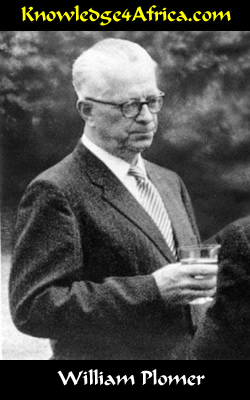|
READ THIS
This is a deeply descriptive poem set in the heat of summer somewhere near Louis Trichardt. The poet
dwells on the intense midday heat which causes all human activity to grind to a standstill.
Nearby, however, he hears the gentle cooing of a flock of wild doves, their sound bubbling forth as a cool
cascade of pleasure to the ears.
 ABOUT THE POET
ABOUT THE POET
William Charles Franklyn Plomer -- pronounced "Ploomer" -- was born in Pietersburg in the
Northern Transvaal in December 1903. Today it is known as Polokwane in the Limpopo Province.
Because his father -- a magistrate -- wanted the best possible education for him, he was
home-schooled at first and then sent to England at a very early age. Later he would return to South Africa,
where he would graduate from St John's College in Johannesburg.
He turned down an offer for a degree at Oxford University but instead became a farmer in the Stormberg
region of South Africa.
He later forces with poet Roy Campbell to edit an Afrikaans literary journal known as Voorslag
but the magazine was not popular, and Campbell and Plomer had a falling-out over objectives.
Plomer became a loner, possibly because of the early separation from his family, but he also developed
an overt homosexual tendency, something which he made no attempt to hide.
He won fame in South Africa for a novel based on an interracial relationship, a theme which was new at
the time but which later became common.
He spent some years in Japan teaching at Tokyo School of Foreign Language and then at a private high
school but in 1929 returned to England which he made his base, although frequently returning to South
Africa.
He had diverse literary talents which included writing poetry, novels and even the librettos for several of
Sir Benjamin Britten's musical compositions.
He was the recipient of several honours such as an Honorary Doctorate from the University of Durham
as well as the Queen's Gold Medal for Poetry. In 1968 he was awarded the C.B.E.
Plomer died in England 1973 at the age of 70.
Have you looked at the questions
in the right column?
|
TEST YOURSELF!
Read the left column and then answer
the following questions:
Where is Louis Trichardt? (2)

[Need help?]
Unless someone has moved it, Louis Trichardt is in the Limpopo Province.
One could be forgiven for believing that it has been moved because not so long ago it was in the Northern
Province. At the time this poem was written, however, it was in the Northern Transvaal! Such is the
delight for changing names in modern South Africa.
Is the town still called Louis Trichardt? Indeed, no! It is now called Makhado, although many still call it
Louis Trichardt.
|
In what season of the year is the poem set? How do you know? (2)

[Need help?]
What time of year is it when it's really hot, and the cicadas are singing their hearts out?
You're right! It's the middle of summer in South Africa. And the cicadas are singing -- they only sing in
December and January.
|
What does one call a poem in which there is no rhyming scheme? (1)

[Need help?]
It could either be Free Verse or Blank Verse.
Blank verse is a type of poetry distinguished by having a regular metre, but no rhyme.
Free verse also has no rhyme scheme but it also has no regular metre.
"Wild doves at Louis Trichardt" is therefore an example of "free verse" because there is
neither a rhyme scheme nor a regular metre.
|
Morning is busy with long files
Of ants and men, all bearing loads.
The sun's gong beats, and sweat runs down.
A mason-hornet shapes his hanging house.
In a wide flood of flowers
Two crested cranes are bowing to their food.
From the north today there is ominous news.
- Why does the poet compare men and ants? (2)

[Need help?]
The ants are workers, while the long line of men are also workers. And so the poet lumps them cleverly
together as workers, and then compares one type of worker to the other.
|
- Why does the poet particularly mention the "mason-hornet" instead of merely calling it a
"hornet"? (2)

[Need help?]
What is the hornet doing? He's building himself a home! What do masons do? They build! And so this
is a mason-hornet and it's building!
The poet is therefore cleverly linking together "mason" and "hornet" -- making it a
compound noun -- so as to provide the reader with some crucial information about the hornet's work.
|
- What figure of speech is used in the words "his hanging house"? (1)

[Need help?]
- What does the poet mean when he says, "From the north today there is ominous
news"? (2)

[Need help?]
It would seem to be a thunderstorm. The thunderstorms are an awesome experience in that part of South
Africa!
|
Midday, the mad cicada-time.
Sizzling from every open valve
Of the overheated earth
The stridulators din it in
Intensive and continuing praise
Of the white-hot zenith, shrilling on
Toward a note too high to bear.
- Quote THREE words or sets of words which indicate that the day is very hot. (3)

[Need help?]

[Need help?]
What time of year is it when it's really hot, and the cicadas are singing their hearts out? It's just about
Christmas time and therefore the middle of summer in South Africa.
The cicadas are therefore commonly known as "Christmas bees" or "Christmas beetles"
because that's the time of year when they sing.
|
- Quote THREE WORDS or SETS OF WORDS from this stanza which tell you that cicadas make a
great deal of noise. (3)

[Need help?]
- "Stridulators din it in";
- "A note too high to bear".
|
|



